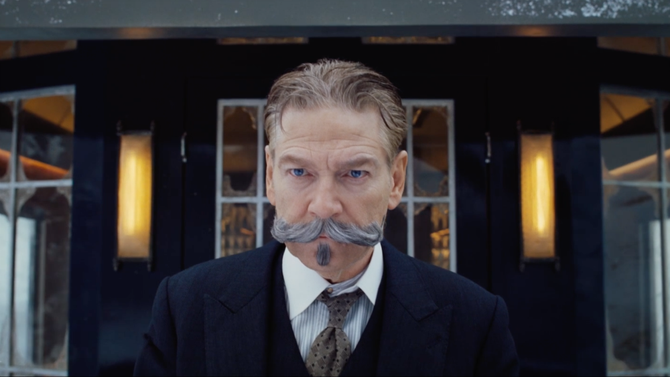Murder on The Orient Express
Directed by Kenneth Branagh
Starring Kenneth Branagh, Penelope Cruz, Judi Dench, Michelle Pfeiffer, Josh Gad
Reviewed by Michael Dalton
[rating: 2/5]
Agatha Christie wrote intricate stories about murder. Well plotted and deliciously convoluted, her characters, the suspects, formed an axis for her hero, the great Hercule Poirot, to spin around. The central concern was always who struck the fatal blow or administered the deadly dose of strychnine or fired the revolver. Little else mattered. It’s a well-known fact that halfway through her prolific career, Christie had come to regret creating the conceited Belgian. He annoyed and frustrated her. Were she still with us, I have no doubt his latest incarnation, as essayed by the well-read and usually intelligent Shakespearean actor Kenneth Branagh, would have further justified such misgivings. I say usually intelligent because in the overhyped new version of Murder on The Orient Express, he’s carelessly remixed one of her most controversial stories into a vanity project of the highest order where the suspects and the murder are shoved into second position. In an early scene, he declares, “I am Hercule Poirot, probably the greatest living detective”. Probably? Those familiar with the source material or the performances by Albert Finney, Peter Ustinov, and David Suchet will scoff at such modesty. Poirot was untouchable, unbeatable, and a genius but most importantly, he knew it.
This new film, a remake of Sidney Lumet’s infinitely superior, award-winning 1974 version, is a curious effort. Well dressed with a galaxy of stars to beat the band and more or less well filmed (I’m no expert on CGI but little of this startlingly pristine movie’s location work looks real), Branagh moves us away from the central elements so completely that when the conclusion is delivered we’ve almost forgotten why we’re here.
First published in 1934, Christie used the Lindbergh tragedy of 1932 as inspiration for the back-story of a baby, Daisy Armstrong, who was held for ransom and eventually murdered. By the time it was over a family had been torn asunder, and five of them died. The story takes up some time later where, after an unnecessary prologue in Jerusalem where Poirot solves a case in front of the Wailing Wall (it ends with a ridiculous scene involving a lynch mob), he boards the Orient Express with a group of people all somehow connected to the Armstrong family along with the man responsible for the tragedy. His name is Ratchett (a miscast Johnny Depp in evil eyeliner), a paranoid sociopath who’s been receiving threatening anonymous letters. He’s butchered soon after the train sets off and when an avalanche strands the train, Poirot, who was hoping for a holiday, steps in to apply his “little grey cells” and solve the case.
The interrogations are the centrepiece of the story (the actors get to strut their stuff) but with the exception of Penelope Cruz (a beautiful understated performance in the same role that won Ingrid Bergman an Oscar), no one here gets a chance to register so busy is Branagh striding about, bellowing, and in one inexplicable scene, literally wrestling with someone for a gun. From Hercule to Hercules! Branagh barely lets us near the suspects (how any director could waste sensational character actors like Derek Jacobi and Judi Dench is a crime I’d like solved) so when we reach the pivotal and comically stagey scene where he delivers the solution (for some unfathomable reason he seats the passengers outside in what appears to be subzero temperatures), we feel nothing. In Christie’s story, the finale left us with a bittersweet sensation, and a sense of release. On this snow-capped mountain, goodbye can’t come soon enough.




